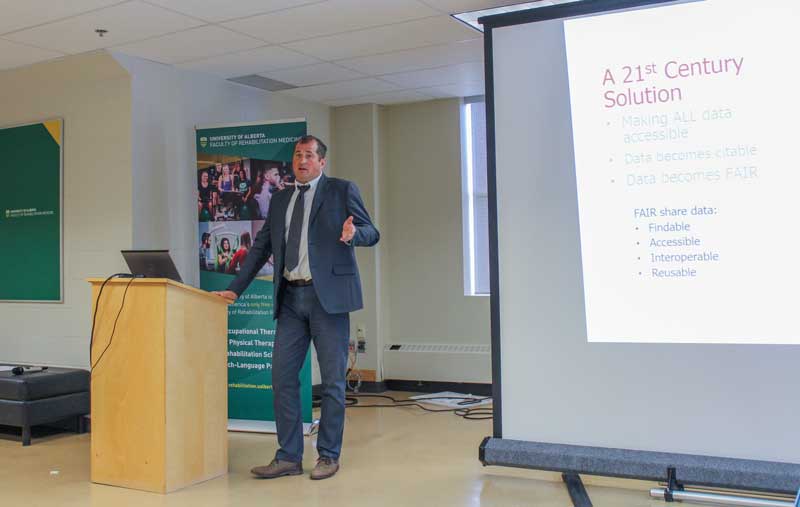 University of Alberta research team receives $3.3 million to create open-source database for international spinal cord injury research
University of Alberta research team receives $3.3 million to create open-source database for international spinal cord injury research
The University of Alberta and the University of California, San Francisco are teaming up to launch the world’s first Open Data Commons for preclinical Spinal Cord Injury research (ODC-SCI). A consortium of international organizations will be providing $3.3 million CAD to help fund the initiative. The ODC-SCI will improve spinal cord injury research and treatment worldwide by reducing data bias and equipping scientists by making data more accessible, enhancing research and translational efforts.
“Congratulations to Karim Fouad and the Faculty of Rehabilitation Medicine for changing the way we do research across the globe. This Open Data Commons has the potential to improve treatment for up to half a million people suffering from spinal cord injuries worldwide, and also influence research in other areas of health, science and rehabilitation,” said Randy Goebel, associate vice-president research, University of Alberta. “Thank you to the Craig H. Neilsen Foundation, Wings for Life Spinal Cord Research Foundation and International Spinal Research Trust for funding this important scientific endeavor and recognizing its importance for the field.”
Karim Fouad, professor and researcher in the Department of Physical Therapy, Faculty of Rehabilitation Medicine, has teamed up with Adam Ferguson at UCSF and Maryann Martone and Jeff Grethe at University of California, San Diego to launch the much needed platform over the next five years. The ODC-SCI will be a database of all SCI research data, not just published results. Research data shared in publications and used by scientists, health-care professionals and even patients, represent only a fraction of research data actually produced. Studies with so called ’negative’ outcomes are generally not published in a journal—‘dark’ data that is estimated to make up 85 per cent of all data collected, representing millions in research dollars.
“For example, when a researcher finds that drug X doesn’t work, that data doesn’t get published, but the data can still be very helpful to further research,” Fouad, Canada Research Chair in Spinal Cord Injury, explains. “An SCI researcher in another country would find it useful to know that drug X didn’t work (at least in the way it was delivered), so that they won’t repeat the study. Or they may see other effects of drug X that could help develop a new study for another therapy to treat SCI’s.”
 Karim Fouad, professor and researcher in the Department of Physical Therapy, Faculty of Rehabilitation Medicine, has teamed up with Adam Ferguson at UCSF and Maryann Martone and Jeff Grethe at University of California, San Diego to launch the much needed platform over the next five years.
Karim Fouad, professor and researcher in the Department of Physical Therapy, Faculty of Rehabilitation Medicine, has teamed up with Adam Ferguson at UCSF and Maryann Martone and Jeff Grethe at University of California, San Diego to launch the much needed platform over the next five years.
The ODC-SCI is welcome news for Ana Lucas-Osma, who suffered a T7 spinal cord injury in Spain when she was 18. She was one of seven passengers in a school van that rolled down a hill and left her in a wheelchair. Now 40 and a research associate in the Faculty of Rehabilitation Medicine as part of Dave Bennett’s and Fouad’s lab team, Lucas-Osma has dedicated her career to SCI research.
“The ODC-SCI is a game-changer not only in research, but also for people like me who have an SCI,” says Lucas-Osma. “Research often takes years. A worldwide open data commons will give researchers access to important data, and in the end, will improve studies and help us find better ways to treat SCI’s. Because that’s what it’s about—improving quality of life for people in my community.”
The first steps in the project officially titled, “Facilitation SCI Research, Translation and Transparency: Going Public with the Open Data Commons” will be outreach to the research community and curation. Then the team will continue to collaborate with Neuroscience Information Framework (NIF, a repository for neuroscience web resources, initiated by the National Institute of Health Blueprint Neuroscience Research) to establish the ODC-SCI operation and integration of meta-analysis tools.
Teren Clarke, CEO, Spinal Cord Injury Alberta, is excited for this global database. “Congratulations to Karim Fouad and his team on this important initiative. We look forward to seeing SCI research transformed and quality of life impacted.”
Wolfram Tetzlaff, director, International Collaboration on Repair Discoveries, believes now is the time for an ODC-SCI. “In fact, it’s about time there is one. Thank you, Karim, Adam and the team for having this vision. We at ICORD and Rick Hansen Institute are grateful for what you have done, and will do, for SCI research.”
By Laurie Wan, University of Alberta
** This post was originally published on https://spinalcordinjuryzone.com/news/53325/first-global-open-data-commons-for-preclinical-spinal-cord-injury-research-will-be-a-game-changer

